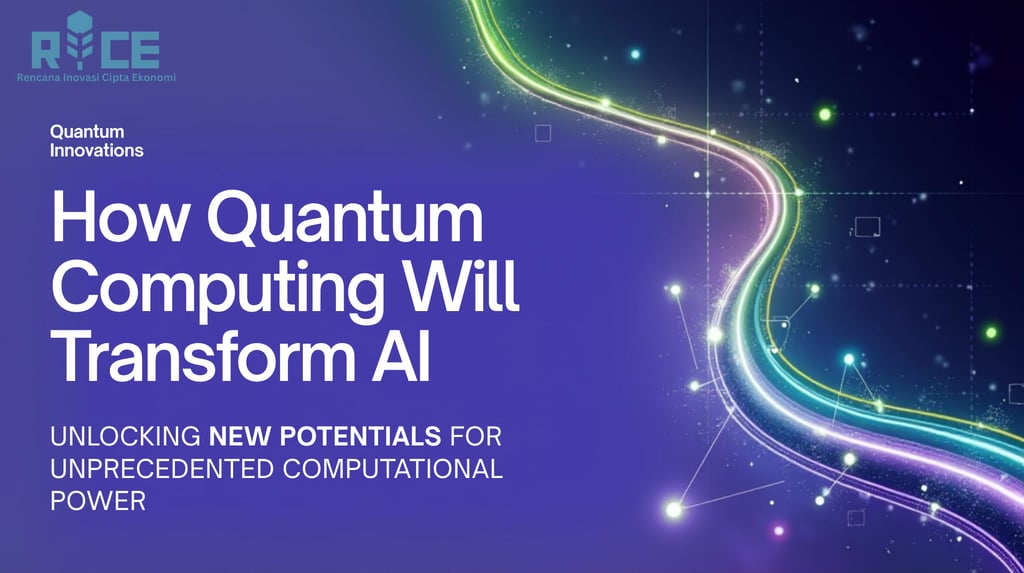How Quantum Computing is Set to Supercharge AI Capabilities
Quantum computing could supercharge AI, revolutionizing healthcare and finance. Yet, hardware challenges remain. Discover the future of this tech synergy .
INDUSTRIES
Rice AI (Ratna)
6/18/20256 min baca


Quantum Computing and AI: A Promising Partnership
Introduction to the Topic
Quantum computing, with its ability to process information using quantum bits (qubits) that can exist in multiple states, promises to tackle problems far beyond the reach of classical computers. AI, meanwhile, excels at learning from data to perform tasks like language understanding and decision-making. Together, they could transform industries by solving complex challenges faster and more efficiently. However, integrating these technologies is complex, with both opportunities and hurdles to consider.
How Quantum Computing Boosts AI
Quantum computing can supercharge AI in several ways:
Speed: Quantum algorithms can reduce training times for AI models, especially for large datasets, potentially transforming machine learning efficiency.
Energy Efficiency: Research shows quantum AI models may use up to 30,000 times less energy for certain tasks compared to classical supercomputers, addressing AI's high energy costs.
Optimization: Techniques like the Quantum Approximate Optimization Algorithm (QAOA) could enhance AI tasks like parameter tuning, improving model performance.
Real-World Applications
Quantum AI could revolutionize industries:
In healthcare, quantum simulations could accelerate drug discovery by modeling molecular interactions, paired with AI for efficacy predictions.
In finance, quantum computing could improve risk analysis and portfolio optimization, with AI enhancing real-time insights.
Climate modeling could benefit from quantum-enhanced accuracy, crucial for mitigation, with AI analyzing simulations.
Comprehensive Analysis: How Quantum Computing is Set to Supercharge AI Capabilities
Introduction and Context
In the dynamic landscape of technology, the fusion of Artificial Intelligence (AI) and Quantum Computing stands as a beacon of innovation, particularly for professionals in AI, data analytics, and digital transformation. AI, defined as systems capable of tasks like learning, reasoning, and perception, has already transformed industries such as healthcare, finance, and transportation. However, the computational demands of training large models, especially with growing datasets, highlight the need for enhanced processing power, where quantum computing could play a pivotal role. Quantum Computing, leveraging quantum mechanics principles like superposition and entanglement, offers computational power that could exponentially surpass classical systems. This article, aimed at readers of an AI and digital transformation consultant's website, provides a deep, research-based exploration of how quantum computing can supercharge AI, backed by trusted sources like academic journals, industry reports, and expert publications, with all claims attributed and referenced at the end.
Understanding Quantum Computing
Quantum Computing operates on qubits, which, unlike classical bits (0 or 1), can exist in multiple states simultaneously due to superposition. Entanglement allows qubits to be correlated, enabling complex computations. This paradigm is particularly suited for problems like optimization, simulation, and factoring, which are computationally intensive for classical computers. However, as of June 18, 2025, quantum computing faces challenges such as error correction and scalability, with current systems limited in qubit count and prone to noise (Polytechnique Insights, 2024).
Defining AI and Its Current Landscape
AI encompasses machine learning, deep learning, natural language processing (NLP), and computer vision, enabling systems to learn from data and perform human-like tasks. Its impact is evident in healthcare (diagnosing diseases), finance (fraud detection), and transportation (autonomous vehicles). However, the computational demands of training large models, especially with growing datasets, highlight the need for enhanced processing power, where quantum computing could play a pivotal role.
The Intersection: Quantum AI and Quantum Machine Learning
The intersection, often termed Quantum AI or Quantum Machine Learning (QML), explores how quantum computing can enhance AI algorithms. Research suggests quantum computing can speed up computations, handle complex data, improve optimization, and enhance security (Quantinuum, 2025). For instance, quantum algorithms like QAOA are noted for their potential in optimization tasks prevalent in AI (Capitol Technology University, 2025).
Specific Enhancements and Applications
Quantum computing enhances AI through several mechanisms, detailed below with examples:
Quantum computing can enhance AI by offering more sustainable, efficient, and high-performance solutions, particularly in natural language processing (NLP), by leveraging quantum phenomena like superposition, entanglement, and interference. Below is a detailed summary of relevant information, including exact numbers and URLs where applicable:
Energy Efficiency: Quantum AI models are more energy-efficient than classical systems. For example, a quantum computer used 30,000 times less energy than the Frontier supercomputer for random circuit sampling.
Parameter Efficiency: Quantum models require fewer parameters, reducing computational demands. Classical neural networks can have billions of parameters; quantum models leverage quantum mechanics for fewer parameters.
Quantum NLP Innovations: Rebuilding machine learning techniques for NLP using quantum computers, focusing on quantum word embeddings, RNNs, transformers, and tensor networks.
Quantum Word Embeddings: Words embedded as complex-valued vectors in Hilbert space, mapped to quantum circuits.
Quantum RNNs: Quantum recurrent neural networks (RNNs) using parameterized quantum circuits (PQCs) for NLP tasks like movie review classification, competitive with classical RNNs, GRUs, LSTMs using only 4 qubits.
Quantum Transformers (Quixer): Quantum-native transformer model, qubit-efficient, applied to language modeling, competitive with classical models, first on realistic datasets. Now running natively on quantum hardware, used in genomic sequence analysis.
Quantum Tensor Networks: Used for NLP tasks like sequence classification, scalable, run on System Model H1, comparable to classical baselines.
Hardware Advantage: Access to world’s most powerful quantum computers, e.g., Helios (1 trillion times more powerful than H2 System), cannot be classically simulated.
Future Impact: Potential to complement/replace classical systems, reduce costs, increase scalability, handle natural language complexities, ushering in transformative era with Gen QAI system.
Specific applications include:
Healthcare: Quantum computing simulates quantum systems for drug discovery, with AI analyzing datasets for efficacy and safety predictions. For example, researchers at the Lerner Research Institute developed a framework combining machine learning with quantum computing to predict protein structures faster and more accurately than classical methods, particularly for small proteins like fragments of the Zika virus (Lerner Research Institute, 2024).
Finance: Quantum computing improves risk analysis and trading strategies, with AI enhancing fraud detection. Quantum algorithms can optimize portfolio management and simulate complex financial models more accurately, adept at simulating simultaneous systematic risks and risk relationships (S&P Global, 2024).
Climate Modeling: Quantum computing can enhance climate models by simulating complex systems like global weather patterns and ocean currents with unprecedented accuracy. For instance, quantum computers can tackle climate models that were previously intractable, offering new insights into the causes and effects of global warming, such as simulating the long-term impact of carbon sequestration techniques or predicting extreme weather patterns with unprecedented accuracy (Vivatechnology.com, 2025). Additionally, quantum computing can help optimize renewable energy systems by improving the efficiency of solar panels and wind turbines, and refine logistics for reducing carbon emissions in transportation and supply chains (Forbes, 2024). IBM is also working with scientists to test quantum systems for climate simulations, using their Qiskit platform for early-stage modeling projects (Netic Space, 2025).
Cybersecurity: While posing threats by potentially breaking encryption, quantum computing offers solutions like quantum-resistant encryption, with AI improving threat detection.
Case Studies and Real-World Context
Leading tech companies are investing in quantum-enhanced AI:
IBM: Developed quantum support vector machines (QSVM), showing higher accuracy with fewer resources than classical SVMs.
Google: Explores quantum computing for AI optimization, demonstrating faster solutions for neural network training.
Microsoft: Offers Azure Quantum, with tools for quantum machine learning, enabling developers to test models.
Quantinuum: Pioneers Generative Quantum AI, with models like Quixer showing energy-efficient NLP performance, such as quantum RNNs for movie review classification and quantum transformers for language modeling, competitive with classical models using only 4 qubits (Quantinuum, 2025).
IonQ and Hyundai: Researching Quantum AI for processing images like road signs for autonomous vehicles, and enhancing large language models (LLMs) with hybrid quantum-classical architectures (Forbes, 2023).
These case studies illustrate active innovation, highlighting practical applications in healthcare, finance, and beyond.
Challenges and Limitations
Despite potential, challenges persist:
Hardware Limitations: Current systems have limited qubits (e.g., up to 6 qubits for quantum transformers) and high error rates, with fault-tolerant systems estimated 15 years away (Polytechnique Insights, 2024).
Algorithm Development: Developing quantum algorithms outperforming classical ones is complex, with no systematic advantage shown yet, as quantum computers are slow in data input/output, expected to match 1999-2000 computer speeds in 5 years (Polytechnique Insights, 2024).
Data Handling: Quantum computers struggle with processing voluminous data from neural networks, limiting AI applications.
Integration Complexity: Requires new architectures, with AI currently essential for designing quantum systems, showing a complementary rather than fully compatible relationship (NVIDIA, 2024).
Analysis and Discussion
The evidence leans toward quantum computing enhancing AI, particularly in speed, efficiency, and specific applications like drug discovery and optimization. However, controversy exists, with some experts, like those at Polytechnique Insights, suggesting less compatibility due to current limitations, while others, like Quantinuum, highlight transformative potential. This dichotomy reflects the field's early stage, with hybrid systems likely bridging gaps. The energy efficiency of quantum AI, with examples like 30,000x less energy use, addresses classical AI's high costs (e.g., GPT-3 training consuming 1,300 megawatt-hours), aligning with sustainability goals. Future implications include ethical considerations like data privacy and algorithmic bias, necessitating frameworks as these technologies scale.
Future-Oriented Outlook
Over the next five years, developments in QML and hybrid systems are expected, with enhanced cybersecurity solutions using AI and quantum computing (S&P Global, 2024). As quantum hardware improves, applications in healthcare, finance, and climate modeling could redefine industry standards, though ethical and societal implications, such as employment impacts, require attention.
References
Quantinuum. (2025). Quantum computers will make AI better. https://www.quantinuum.com/blog/quantum-computers-will-make-ai-better
S&P Global. (2024). Artificial intelligence and quantum computing: The fundamentals. https://www.spglobal.com/en/research-insights/special-reports/artificial-intelligence-and-quantum-computing-the-fundamentals
Polytechnique Insights. (2025). Quantum computing and AI: Less compatible than expected? https://www.polytechnique-insights.com/en/columns/science/quantum-computing-and-ai-less-compatible-than-expected/
Lerner Research Institute. (2025). How quantum computing will affect artificial intelligence applications in healthcare. https://www.lerner.ccf.org/news/article/?title=%2BHow%2Bquantum%2Bcomputing%2Bwill%2Baffect%2Bartificial%2Bintelligence%2Bapplications%2Bin%2Bhealthcare%2B&id=79c89a1fcb93c39e8321c3313ded4b84005e9d44
Reichental, J. (2023, November 20). Quantum artificial intelligence is closer than you think. Forbes. https://www.forbes.com/sites/jonathanreichental/2023/11/20/quantum-artificial-intelligence-is-closer-than-you-think/
Capitol Technology University. (2025). Supercharging AI with quantum computing: A look into the future. https://www.captechu.edu/blog/supercharging-ai-quantum-computing-look-future
#QuantumComputing #AI #Innovation #Technology #FutureTech #DigitalTransformation #Healthcare #Finance #ClimateModeling #TechTrends #DailyAIIndustry
RICE AI Consultant
Menjadi mitra paling tepercaya dalam transformasi digital dan inovasi AI, yang membantu organisasi untuk bertumbuh secara berkelanjutan dan menciptakan masa depan yang lebih baik.
Hubungi kami
Email: consultant@riceai.net
+62 822-2154-2090 (Marketing)
© 2025. All rights reserved.


+62 851-1748-1134 (Office)
IG: @riceai.consultant
